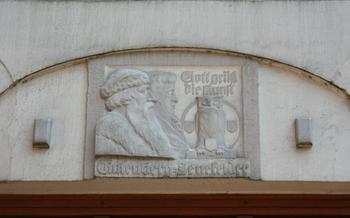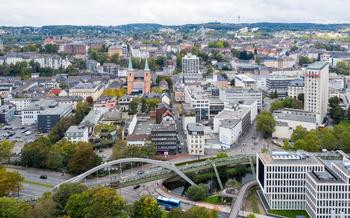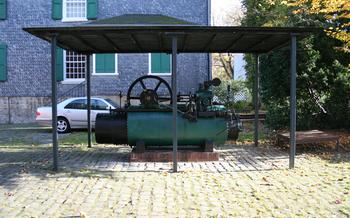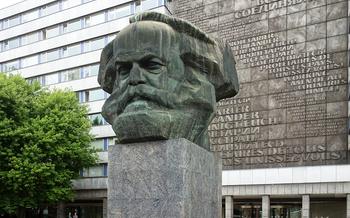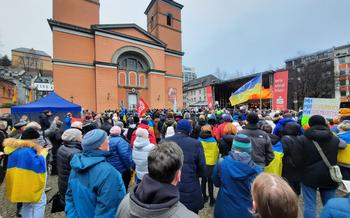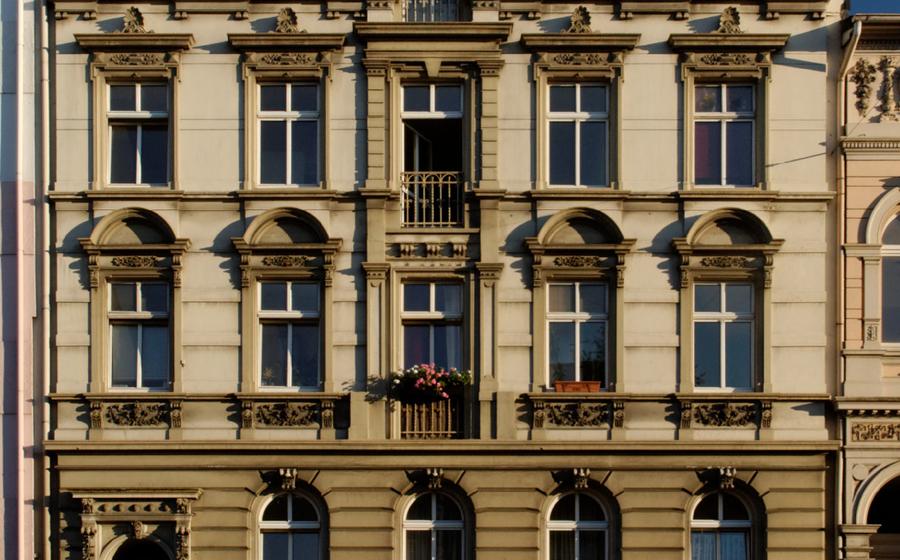
Engels Haus (Engels House)
- The Engels House in Wuppertal: A Historical Gem
- Exploring the Engels House Museum
- Unveiling the Life of Friedrich Engels
- Engels's Contributions to Social Theory
- Engels's Legacy and Impact
- Guided Tours and Educational Programs
- Exhibitions and Special Events
- Accessibility and Practical Information
- Engels's Influence on Modern Society
- Research and Academic Resources
- Engels's Personal Life and Relationships
- Engels's Contributions to the Arts and Culture
- Engels's International Impact
The Engels House in Wuppertal: A Historical Gem
In the heart of Wuppertal, nestled amidst the city's vibrant tapestry of history and culture, lies the Engels House, a testament to the life and legacy of one of the most influential thinkers of the 19th century - Friedrich Engels. This remarkable building, steeped in historical significance, marks the birthplace of a man who, alongside Karl Marx, revolutionized the landscape of social and political thought. Engels, a renowned philosopher, sociologist, and co-author of The Communist Manifesto, played a pivotal role in shaping the modern socialist movement, leaving an indelible mark on the course of history.
The Engels House stands as a testament to the enduring impact of Engels's ideas, transformed into a museum dedicated to preserving his life's work. Recognized as a historical monument and incorporated into the Wuppertal City Museum, this meticulously restored abode invites visitors to embark on a journey through time, exploring the profound contributions of a visionary thinker who dedicated his life to the pursuit of social justice and the liberation of the working class.
Exploring the Engels House Museum
The Engels House Museum is a captivating journey through the life and work of Friedrich Engels. Interactive exhibits, multimedia presentations, and personal artifacts bring Engels's world to life, offering an immersive experience that transports visitors back in time.
Here, you'll gain insights into Engels's childhood, family background, and the early influences that shaped his thinking. Discover his contributions to philosophy, economics, and social theory, and witness how his ideas left an indelible mark on the labor movement and the development of socialism.
Through engaging displays and interactive installations, the museum provides a comprehensive overview of Engels's life and work, making it a must-visit destination for anyone interested in history, politics, and social justice.
Unveiling the Life of Friedrich Engels
Friedrich Engels's life was marked by diverse experiences and unwavering dedication to social justice. Born into a wealthy industrialist family in Wuppertal, Engels witnessed firsthand the stark contrasts between the privileged and the working class. This exposure to social inequality shaped his perspectives and influenced his later work.
Engels's multifaceted career reflected his broad interests and commitment to social change. He worked as a businessman, immersing himself in the realities of the capitalist system he sought to critique. Later, he became a journalist, using his writing skills to expose the plight of the working class and advocate for their rights.
Engels's collaboration with Karl Marx marked a turning point in his life. Together, they developed the foundations of Marxism, a revolutionary ideology that would profoundly impact the course of history. Their partnership was based on shared intellectual pursuits, mutual respect, and a deep friendship that lasted until Marx's death.
Engels's unwavering commitment to social justice led him to become a leading figure in the Communist League, a revolutionary organization dedicated to overthrowing capitalism and establishing a socialist society. Throughout his life, Engels remained a tireless advocate for workers' rights and a visionary thinker who sought to create a more just and equitable world.
Engels's Contributions to Social Theory
Friedrich Engels made significant contributions to social theory, leaving a lasting impact on the field of sociology. His groundbreaking work, The Condition of the Working Class in England, published in 1845, is considered a seminal text in the study of the working class and the exploitation they faced under capitalism. Engels meticulously documented the deplorable living and working conditions of the working class in Manchester, England, shedding light on the harsh realities of industrial society.
Engels's analysis of the working class extended beyond mere observation; he developed a theoretical framework to understand their exploitation. He argued that the capitalist system, based on the private ownership of the means of production, inherently leads to the exploitation of workers. The bourgeoisie, or capitalist class, extracts surplus value from the labor of the proletariat, or working class, resulting in the accumulation of wealth for the few at the expense of the many.
Engels's theories on historical materialism, developed in collaboration with Karl Marx, provided a comprehensive understanding of social development. He asserted that the material conditions of society, particularly the mode of production, determine the social, political, and ideological structures. This theory challenged traditional notions of history as driven by great individuals or abstract ideas, emphasizing the role of economic factors in shaping human societies.
Engels also delved into the analysis of the family, gender, and the oppression of women in capitalist societies. In his book The Origin of the Family, Private Property, and the State, he argued that the family structure under capitalism serves to maintain class divisions and perpetuate the subjugation of women. He advocated for the liberation of women through the abolition of private property and the establishment of a socialist society.
Engels's contributions to social theory laid the foundation for modern sociological thought and continue to influence contemporary debates on class, inequality, and social change. His insights into the workings of capitalism and the struggles of the working class remain relevant in understanding the social dynamics of our world today.
Engels's Legacy and Impact
Friedrich Engels's contributions to social theory and his collaboration with Karl Marx had a profound impact on the development of Marxism and its subsequent influence on socialist movements worldwide. His writings, particularly "The Condition of the Working Class in England," provided a groundbreaking analysis of the exploitation of the working class under capitalism. Engels's theories on historical materialism, class struggle, and the family laid the foundation for understanding the dynamics of social change and the path towards a socialist utopia.
His legacy extends beyond his theoretical contributions to his unwavering commitment to social justice and the fight for workers' rights. Engels was a passionate advocate for the working class and played a crucial role in organizing and mobilizing workers' movements. His writings inspired generations of activists, revolutionaries, and social reformers to challenge the existing order and strive for a more just and equitable society.
Engels's ideas continue to resonate in contemporary debates on social justice, economic inequality, and the struggle for workers' rights. His analysis of capitalism's inherent contradictions and the potential for revolutionary transformation remain relevant in addressing the challenges of the 21st century. Engels's legacy as a revolutionary thinker and his enduring impact on social and political thought continue to shape our understanding of society and the pursuit of a better world.
Guided Tours and Educational Programs
The Engels House offers a range of guided tours tailored to diverse interests and age groups. These tours provide visitors with an immersive experience, allowing them to delve deeper into Engels's life, work, and the historical context of his time. Knowledgeable guides lead visitors through the exhibits, sharing insights into Engels's contributions to philosophy, economics, and social theory.
The museum also organizes educational programs and workshops catering to students, researchers, and the general public. These programs offer opportunities for participants to engage with Engels's ideas, explore the history of socialism and the labor movement, and gain a deeper understanding of social and economic issues.
For those seeking a more active involvement, the Engels House welcomes volunteers who contribute to the museum's operations, public outreach, and educational initiatives. Volunteering offers a unique chance to learn from experts, collaborate with like-minded individuals, and make a meaningful contribution to preserving and sharing Engels's legacy.
Exhibitions and Special Events
The Engels House is not just a museum; it is a vibrant cultural hub that hosts a variety of temporary exhibitions, events, and lectures throughout the year. These events provide an opportunity to delve deeper into Engels's life and work, explore related themes, and engage with experts and fellow enthusiasts.
Temporary exhibitions often focus on specific aspects of Engels's life or work, shedding light on his contributions to philosophy, economics, and social theory. These exhibitions often feature rare artifacts, documents, and multimedia presentations that bring Engels's ideas to life.
The Engels House also hosts regular lectures, seminars, and workshops on topics related to Engels and the labor movement. These events provide a platform for scholars, researchers, and activists to share their insights and engage in discussions with the public.
Special events, such as film screenings, book readings, and musical performances, are also organized at the museum. These events offer a unique way to experience Engels's legacy and connect with his ideas in a creative and engaging manner.
To stay informed about upcoming exhibitions and events, visitors can check the Engels House website or follow the museum on social media.
Accessibility and Practical Information
The Engels House is conveniently located in the city center of Wuppertal, a short walk from the main train station. It is easily accessible by public transportation, with buses and trams stopping nearby.
The museum is open to the public from Tuesday to Sunday, with guided tours available in German and English at specific times throughout the day. Admission fees are reasonable, with discounts for students, seniors, and groups.
The Engels House is wheelchair accessible, with ramps and elevators providing access to all floors of the museum. Visitors with disabilities are also offered special guided tours upon request.
To enhance your visit, consider booking a guided tour in advance, especially if you are interested in a specific aspect of Engels's life or work. Guided tours provide a deeper insight into the exhibits and allow you to ask questions to the knowledgeable museum staff.
The Engels House also offers educational programs and workshops for students, researchers, and the general public. These programs cover a wide range of topics related to Engels and his work, such as social theory, labor history, and the history of socialism.
If you have any specific questions or require further assistance, do not hesitate to contact the museum staff. They are always happy to help and ensure that you have an enjoyable and informative visit to the Engels House.
Engels's Influence on Modern Society
Friedrich Engels's ideas continue to resonate in contemporary society, offering insights into social justice, economic inequality, and the struggle for workers' rights. His theories on historical materialism, class struggle, and the exploitation of the working class remain relevant in understanding the dynamics of modern capitalism. Engels's critique of the capitalist system and his vision of a socialist society continue to inspire movements for social change and economic equality worldwide.
His analysis of the family, gender, and the oppression of women in capitalist societies has also had a profound impact on feminist thought and activism. Engels's writings on the origins of the family and the role of women in history have challenged traditional notions of gender roles and contributed to the development of feminist theory. His ideas on the liberation of women and the need for gender equality remain influential in contemporary feminist movements.
Engels's legacy extends beyond his theoretical contributions. His commitment to social justice and his unwavering support for workers' rights have left a lasting impact on labor movements and trade unions worldwide. His writings and activism have contributed to the development of labor laws, social welfare programs, and workers' rights protections in many countries.
Research and Academic Resources
The Engels House is not just a museum; it is also a hub for research and academic activities. It houses an extensive library and archives containing a wealth of resources on Engels, Marx, and the history of socialism. Researchers and scholars from around the world visit the Engels House to access these materials and collaborate with other experts in the field. The museum also organizes regular conferences, seminars, and workshops, providing a platform for researchers to present their findings and engage in discussions with peers. If you are interested in conducting research on Engels or related topics, the Engels House is an invaluable resource.
Engels's Personal Life and Relationships
Friedrich Engels's personal life was marked by complex relationships and enduring partnerships. His most significant relationship was with Karl Marx, his lifelong friend and collaborator. Their intellectual and political alliance shaped the development of Marxism and influenced the course of history. Engels provided Marx with financial support, intellectual companionship, and editorial assistance, contributing significantly to the success of their joint endeavors.
Engels also had a complex relationship with his family. Born into a wealthy industrialist family, he experienced firsthand the contradictions of capitalism and the exploitation of the working class. His father, a successful textile manufacturer, initially opposed Engels's socialist views, but eventually came to respect his son's commitment to social justice. Engels maintained a close relationship with his sisters, who shared his intellectual interests and supported his political activities.
Despite his dedication to his work and his comrades, Engels remained a private and introspective individual. He never married and had no children, choosing to focus his energies on his intellectual pursuits and the struggle for social change. His personal life, intertwined with his political and philosophical commitments, offers insights into the complexities of a man who dedicated his life to revolutionizing society.
Engels's Contributions to the Arts and Culture
Friedrich Engels's interests extended beyond politics and economics to encompass literature, art, and culture. He was an avid reader and writer, and his works on cultural topics provide valuable insights into his intellectual development. Engels's writings on art and literature explored the relationship between aesthetics and social conditions, arguing that art and culture are not merely reflections of the material world but also active forces in shaping society. He was a strong advocate for the promotion of cultural activities and institutions, believing that access to culture was essential for the intellectual and moral development of the working class. Engels's contributions to the arts and culture underscore his commitment to a well-rounded and fulfilling life for all, where artistic expression and social progress are intertwined.
Engels's International Impact
Friedrich Engels's ideas transcended national boundaries and had a profound impact on the international socialist movement. His works were translated into numerous languages and disseminated across the globe, influencing revolutionary movements and shaping political thought in various countries.
In particular, Engels's collaboration with Karl Marx in the development of Marxism played a crucial role in the formation of socialist parties and organizations worldwide. Their writings provided a theoretical framework for understanding capitalism, class struggle, and the path towards a socialist society.
Engels's analysis of the working class and his critique of capitalism resonated with workers and activists in many countries, inspiring them to organize and fight for their rights. His ideas contributed to the rise of labor movements and socialist parties across Europe, including the formation of the Social Democratic Party of Germany (SPD) and the Labour Party in Britain.
Beyond Europe, Engels's writings also had a significant impact in countries such as Russia, China, and Latin America. His works were translated into Russian and became influential among revolutionary thinkers, including Vladimir Lenin and Leon Trotsky. In China, Engels's ideas were embraced by Mao Zedong and other communist leaders, shaping the development of the Chinese Communist Party.
Engels's international impact extended beyond the realm of politics. His writings on literature, art, and culture also gained recognition and influenced intellectuals and artists worldwide. His essays on realism in literature and his analysis of the relationship between art and society continue to be studied and debated in academic circles.
Overall, Friedrich Engels's ideas transcended national borders and had a profound impact on the development of socialism and social thought around the world. His writings continue to be studied and debated, inspiring new generations of activists and scholars to work towards a more just and equitable society.
